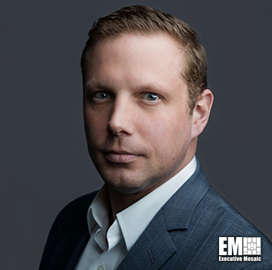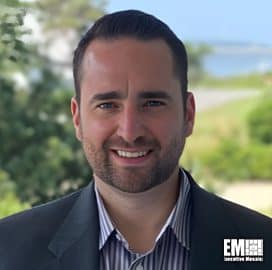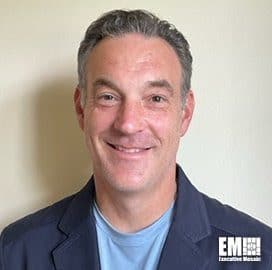
Brian Baney
VP, Corporate Development
Aeyon
Member Profile: Brian Baney, VP of Corporate Development at Aeyon
The Potomac Officers Club recently spoke with Brian Baney, vice president of corporate development at Aeyon, to learn more about what inspired him to begin a career in the GovCon space, the goals he wants to accomplish, which attributes make a winning team and more. After starting his career in the public sector, Baney spent over seven years with IBM. He has served as corporate development VP for nearly two years, and he’s been with Aeyon for over seven.
What can you tell us about your background and how you’ve been able to adapt to the ever-changing challenges of the federal landscape over the course of your career?
I began my career in the federal government as an analyst at the Transportation Security Administration. I began to learn and appreciate how organizations are driven by policy, process and procedure. I realized that I could not do work independently; every initiative required input and approval from individuals and organizations outside of my own. I began to devise strategies to accomplish objectives by building relationships, making convincing arguments, accounting for other’s equities and conveying information, with the goal of receiving approval.
This approach hasn’t changed, but access to available information has grown exponentially, and doubters and naysayers also have access to this data. I’ve learned to harness this information to take a more informed position or make a data-driven decision, while relying on strong relationships to continue to push initiatives. Regardless of how much government changes — the people, the processes, the technology — the ability to use all available data to make an informed decision will help get you to desired results.
When did you decide to pursue a career in the federal landscape and what were the key tasks that you wanted to complete? Any bigger goals you still want to accomplish?
I wanted to begin my career in the federal government when I was in college. I was fascinated by the impact that government could have all over the globe. I graduated a couple of years after 9/11 and possessed the passion for doing something for the county; the opportunity to work at the Transportation Security Administration was a means to achieve that. I loved aviation and wanted the industry to be safe and secure.
I learned at the Transportation Security Administration that the partnership between the federal government and commercial industry is critical. While everything was done in the name of security, every security measure has an impact on commerce, personal liberties and the freedom of movement. My focus at the time was on policy and regulation and the steps the agency could take procedurally to enhance security. I was involved in decisions that implemented security measures and benefits that hopefully exceeded the costs associated with them.
It is a difficult task that possess a high-risk calculus, and I can empathize with the individuals that need to make these decisions today. The scrutiny is more intense, and the measures of success are higher. I want nothing more than the Transportation Security Administration to be successful. However, I now look at security differently and am interested in the technical solutions that can address the biggest security challenges. It is amazing how software, data and automation have improved almost everything in our lives, including safety and security. There is no question that we can simplify security, and I hope we can continue to advance these concepts in the security arena.
What do you believe are your core strengths as a leader and what lessons taught you the most about driving success?
I try to build a team where my team members will be better at my job than me. If my team members are more successful than me, then I feel I’ve done my job as a leader. I believe this starts with accountability. I try to build an environment where people need to make their own decisions and justify how they came to those decisions. There is a tremendous amount of learning and growth that comes from decision-making, plus it allows people to feel empowered and autonomous, which I believe they appreciate professionally.
I’ve made many mistakes in my career and learned plenty of lessons; I want my team to feel comfortable making mistakes (i.e., taking some risks), while knowing that I will support them when we need to fix things. This supports accountability while trying to build the confidence I feel my team needs to perform their responsibilities, whether it is dealing with a client, making a project or pursuing an opportunity. Some of my best managers have coached me to excel at a role better than they do, and I try to instill that belief in my team.
I think the best piece of advice I received is to never believe that my success is individual, or solely because of me. Whenever I received a promotion or had an exciting win, I tried to remember all the people that got me to that point. But success can also be the results of others’ mistakes. This is the case in government contracting.
When we’ve won a big deal, I try not to assume it was because our bid was much stronger than the competitions. Be sure to ask why. Perhaps the competition made a mistake that allowed us to score higher than them. There are many lessons to learn from this, and I try to carry them to future deals. Success requires you to be dynamic; once you find success, others will attempt to emulate it, and they will eventually be better than you if you remain complacent. Not only learn from your mistakes, but your successes, as well. I believe this goes a long way to staying ahead of the competition.
What are the core values that you believe are essential to build a great team and establish a foundation to drive success in such a competitive industry?
I think the most critical attribute is honesty, which builds trust and leads to cohesiveness. Without honesty, it all unravels. In such a competitive industry, success relies on everyone to execute their responsibilities to achieve a collective means. When the team cannot be honest with each other, management breaks down, schedules slip and quality suffers. This lack of trust is a recipe for failure, and it applies to all tasks big and small. I have a lot of respect for someone that is honest about the challenges they are facing, versus someone that tries to hide these challenges. It is allows us to devise a plan and come to solution, versus dealing with an increased risk of failure. We all learn that way, and are all better off.
How would you advise someone entering our industry to build their resume and advance their careers to be in the best position in the years to come?
I would recommend that a new entrant immerse themselves in the challenges our customers are trying to address. The greatest benefit someone can receive in this business is working on a client engagement or meeting directly with customers to understand, first-hand, their challenges. This direct engagement builds an appreciation for the problem and sets the foundation for how to address it. Government faces immense challenges, and thinking there is an external solution can be limiting. Government uses very different metrics than private industry, so it is critical to understand these nuances. This is not to say that there isn’t a commercial solution to a government problem; you just need to consider how to apply that solution to account for those differences. Getting directly involved will go a long way towards success.

Category: Executive Profiles




